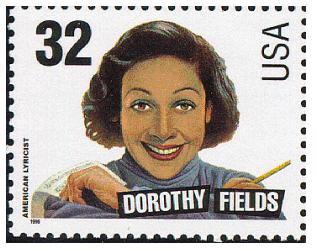
Most people, up to a point, can write. The skill of professional writing, however, is re-writing. Not just being able to fix something that isn't correct, but the ability to find what's wrong that needs correcting in the first place. And do this draft after draft after draft... And do it implementing not only your own thoughts, but the two-cents of others. Sometimes with good suggestions, sometimes not, but you have to make them work.
Making this all the more difficult is when the original material is actually good. Or even wonderful. To be able to see something that you put all your creative effort in and come up with something you're really pleased with -- and then see it's wrong and make it better... that's what separates the best professionals from the rest.
And here's an example of this, from a master of the craft.
This master, Dorothy Fields, is one of the great, less-known Broadway and Hollywood musical lyricists. She's famous, to be sure, but largely in historic Broadway circles. But step outside that circle, and while people will know Oscar Hammerstein, Alan Jay Lerner, Lorenz Hart, Ira Gershwin, Sheldon Harnick, Fred Ebb and some others (speaking of pure lyricists, rather than composer-lyricists), the name of Dorothy Fields isn't recognizable to the general public. But there are two things about Dorothy Fields -- one is that the work she did (which lasted an incredibly long time, from 1928 to 1973) was of the highest quality, and the other is that she was a female Broadway lyricist at a time when women just didn't do that. It's not that you'd be hard pressed to simply find many other women writing musicals in the '30s and '40s -- it's that it would be near impossible to find other women writers on Broadway at that time who were even in the near-vicinity as successful. Dorothy Fields didn't just break ground as a role model, she built a tower that stood by itself.

Among her many songs, she wrote the lyrics for such standards as "On the Sunny Side of the Street," "I Can't Give You Anything but Love, Baby," the Oscar-winning "The Way You Look Tonight," "I'm in the Mood for Love," several Fred Astaire classics -- "I Won't Dance," "A Fine Romance," and "Pick Yourself Up," and countless others.
She wrote lyrics for the musical, Sweet Charity (with such songs as "Hey, Big Spender" and "If My Friends Could See Me Now"), A Tree Grows in Brooklyn (that included the classic comedy gem, "He Had Refinement"), Redhead (that won six Tony Awards, including Best Musical), Seesaw (with its joyous, "It's Not Where You Start, It's Where You Finish") and many more. She even co-wrote the book to the legendary musical, Annie Get Your Gun
But the point of this is re-writing. And in particular, the ability to take a wonderful song, understand that it's not right, and make it better. It's important to know who Dorothy Fields was, in order to appreciate her work all the more, but the work by itself speaks volumes. And in this example, it starts with a song that she wrote for the aforementioned Seesaw, that starred Michele Lee and Ken Howard. The song, "Big Fat Heart," is sung by the female lead who has been a good-hearted loser her whole life. It's a terrific, touching, and very funny song, with joyously clever rhymes -- but it was ultimately cut from the show. Wonderful as it was, it simply wasn't considered right for the character. But here it is, performed by Debbie Shapiro Gravitte from the album, Lost in Boston.
Now, by any stretch of the imagination, and by most standards, "Big Fat Heart" is terrific. But for whatever reason, it wasn't what they wanted. Maybe they felt it was too self-critical, maybe it seemed too bleak, maybe it conflicted with a scene, who knows? But Dorothy Fields and composer Cy Coleman went back to the drawing board and had to come up with something else.
Imagine having to go up to your show's star, Michele Lee, and tell her, "Y'know that great song you love performing so much, 'Big Fat Heart'? Well, er...we have bad news for you -- we've cut it from the show." But after all the agony and angst that might have followed, they then got to say, "But, here's the thing. This is the new one. We think you might like it even more. Let us play it for you. It's called, 'Nobody Does It Better Than Me.'"
And this is what Michelle Lee ended up singing on stage in Seesaw.
That, ladies and gents, is professional re-writing. Even more simply put, that's just great writing. It tells a character, tells a story, has some remarkable rhymes, flows beautifully, it isn't quite as self-loathing but more subtly self-effacing, and is just a gem of a song.
And Dorothy Fields is a gem of a writer.
And nobody did it like her.
*
To read more from Robert J. Elisberg about other matters from politics, entertainment, technology, humor, sports, and a few things in between, visit Elisberg Industries.
